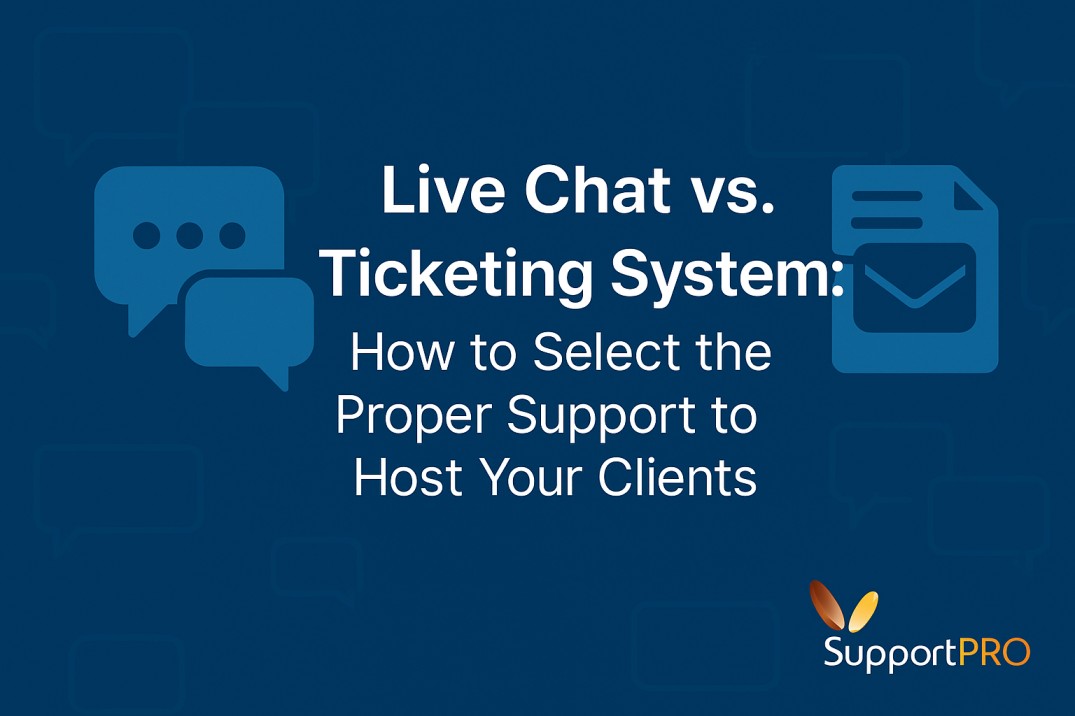Introduction
What you pay for when you pay for a host is not just servers. You’re also relying on the people operating those servers to take care of any issues that crop up. The communication methods of the support teams are as much a concern to many customers as the uptime assurances themselves.
There are two support models that hosting companies use: a ticketing system and live chat. Both have their use, advantages, and disadvantages, and situations where it is better to use. The issue is not which one is better but which one is right for you and your clients.
Live Chat: Speed and Convenience
Live chat is appealing to several industries because it is real-time and convenient. In the hosting, it enables the customer to contact the live chat support operator without having to exit the client portal or website. They like that they will be able to obtain solutions to their queries, multitask during the chat and talk to another human in real time.
Where it fails:
- Problems requiring logs or extensive investigation.
- It takes extra human labor as it must be staffed.
- An out-of-the-blue traffic spike, such as during a lull, can flood the queue.
Short and concise, live chat suits minor repairs or pre-sale questions and first-line support but isn’t always effective when the problem is long or technical.
Ticketing: Structure and Reliability
Ticketing systems are the basis for traditional hosting support. Customers submit issues via email or web form, and a ticket is opened in the system to track the issue to its closure. This is effective because every issue is recorded, complex issues are escalated smoothly, and there is no need for live interaction. Further, the tickets can be incorporated into company knowledge bases and provide reference material that assists future customers.
Its disadvantages:
- Early responses may be slow.
- Customers may feel less engaged than they would if they were chatting live.
- Malfunctioning systems may also cause the build-up of open cases.
Ticketing is most useful when precision, recording, and escalation are important (i.e., compliance-heavy or highly technical problems).
Matching Models to Customers
Different hosting types appeal to different individuals, and thus the right support model has to be selected.
- Shared hosting: Start with live chat followed by ticketing as secondary support.
- VPS & dedicated: The customers need higher-level tech support, and thus tickets have to be the first level, with chat being a second-level option for high-priority requests.
- Cloud and enterprise (for advanced workloads): Enterprise setups (e.g., Azure) will always necessitate ticketing for hosting. Live chat systems would still find application in VIP customers or high-priority cases.
The hybrid model is the winner more than not. Live chat as initial contact and ticketing for follow up.
Conclusion
In terms of client hosting, support is equally important to server uptime. Live chat provides instantaneity and convenience, while ticketing systems offer predictability and organization. Neither is superior or inferior just a matter of the client need and hosting model.
Most of the time, the best solution is a combination of both. With assistance from SupportPRO, companies have access to a pool of professionals and experts who provide responsive, reliable, and cost-effective assistance. That’s the kind of service that turns clients into long-term business partners.
Live chat needs more staff for immediate coverage, especially if the firm has 24/7 support. Ticketing is more scalable, where fewer staff are needed, but response times become an issue. To achieve cost and customer satisfaction, firms tend to follow a hybrid approach, wherein live chat is performed during business hours and ticketing during off-hours. In doing so, the providers save on expenses and retain their clients. At SupportPRO, we understand that live chat vs. ticketing is more than technology; it is about the engagement of individuals, processes, and client expectations.


